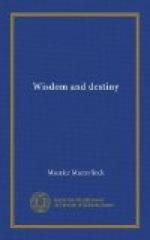Suffering, sorrow, tears, regrets—these words, that vary so slightly in meaning, are names that we give to emotions which in no two men are alike. If we probe to the heart of these words, these emotions, we find they are only the track that is left by our faults; and there where these faults were noble (for there are noble faults as there are mean or trivial virtues) our sorrow will be nearer akin to veritable happiness than the happiness of those whose consciousness still is confined within narrowest limits. Would Carlyle have desired to exchange the magnificent sorrow that flooded his soul, and blossomed so tenderly there, for the conjugal joys, superficial and sunless, of his happiest neighbour in Chelsea? And was not Ernest Renan’s grief, when Henriette, his sister, died, more grateful to the soul than the absence of grief in the thousands of others who have no love to give to a sister? Shall our pity go forth to him who, at times, will weep on the shore of an infinite sea, or to the other who smiles all his life, without cause, alone in his little room? “Happiness, sorrow”—could we only escape from ourselves for one instant and taste of the hero’s sadness, would there be many content to return to their own superficial delights?
Do happiness and sorrow, then, only exist in ourselves, and that even when they seem to come from without? All that surrounds us will turn to angel or devil, according as our heart may be. Joan of Arc held communion with saints, Macbeth with witches, and yet were the voices the same. The destiny whereat we murmur may be other, perhaps, than we think. She has only the weapons we give her; she is neither just nor unjust, nor does it lie in her province to deliver sentence on man. She whom we take to be goddess, is a disguised messenger only, come very simply to warn us on certain days of our life that the hour has sounded at last when we needs must judge ourselves.
46. Men of inferior degree, it is true, are not given to judging themselves, and therefore is it that fate passes judgment upon them. They are the slaves of a destiny of almost unvarying sternness, for it is only when man has been judged by himself that destiny can be transformed. Men such as these will not master, or alter within them, the event that they meet; nay, they themselves become morally transformed by the very first thing that draws near them. If misfortune befall them, they grovel before it and stoop down to its level; and misfortune, with them, would seem always to wear its poorest and commonest aspect. They see the finger of fate in every least thing that may happen—be it choice of profession, a friendship that greets them, a woman who passes, and smiles. To them chance and destiny always are one; but chance will be seldom propitious if accepted as destiny. Hostile forces at once take possession of all that is vacant within us, nor filled by the strength of our soul; and whatever is void in the heart or the




